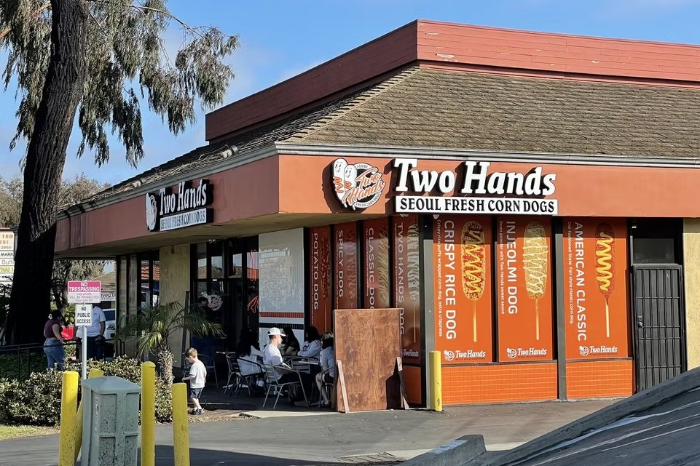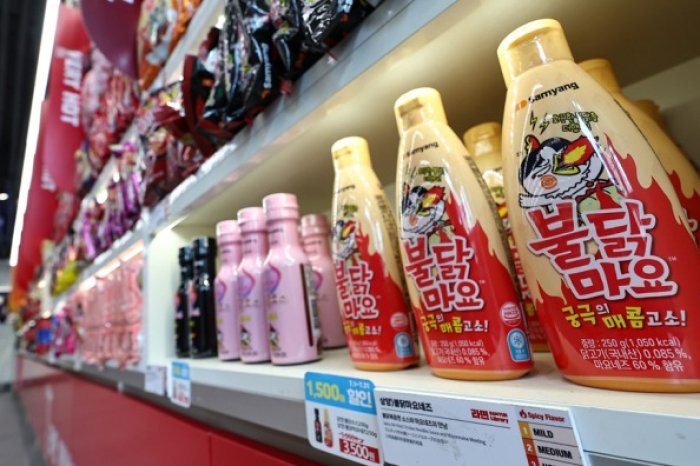
Korean dining chains are springing up across the US, fueled by health-conscious eating and the surging influence of Korean pop culture, boosting expectations for a rise in exports of Korean sauces and condiments.
According to the restaurant franchise industry on Monday, the opening of Korean cuisine-based restaurant franchise operations has gained further traction this year, with each brand adding dozens of new outlets.
Leading the pack is KPOT Korean BBQ & Hot Pot, better known as KPOT, which already runs more than 100 restaurants across the US and has another 50 in the pipeline.
Launched in 2018 by Vertex Hospitality, KPOT has grown popular for its Korean barbecue and Asian hot pot, served in a traditional setting with tabletop grills for do-it-yourself cooking.
Unlike traditional Korean restaurants run by Korean Americans or Korean-born chefs, this chain is operated by entrepreneurs from non-Korean backgrounds.
BOOMING KOREAN RESTAURANTS
Other up-and-coming Korean food franchises are treading a similar path.

Zen Korean BBQ House, another authentic Korean barbecue restaurant chain, saw its total franchise dining houses topped 50 in the US as of July. It plans to add 10 new locations in the rest of this year.
Casual Korean dining experience is also gaining momentum.
Bibibop Asian Grill, or Bibibop, which is a fast-casual restaurant offering customizable, gluten-free Asian bowls inspired by traditional Korean bibimbap, expects its franchise outlets to grow to 80 this year.
Cupbop, an American fast casual restaurant chain serving street-food style Korean barbecue in a cup, has also surpassed 70 franchises.
Korean desserts are also riding the wave.
Two Hands Corn Dogs, founded in 2019 by Two Hands America Inc., has grown to more than 70 US outlets this year, making it the country’s fastest-growing corn dog franchise with its made-to-order snacks featuring a Korean twist.
BonChon, selling Korean fried chicken and other Korean dishes, has also grown to over 150 franchises across the country.
TIME FOR K-SAUCE

The biggest difference between today’s Korean restaurant chains and traditional Korean dining houses lies in their customer base.
Whereas Korean eateries in the US once catered mainly to Korean tourists and residents, the new wave of Korean food franchises attracts a far more diverse clientele, pushing K-food into the American mainstream much like Japanese cuisine.
Driving this shift is the unstoppable global wave of Korean culture, which continues to spread across the world’s largest consumer market.
Korean food companies are pinning high hopes on the trend, expecting US sales of Korean sauces and condiments to rise.

Samyang Foods Co., behind the global runaway hit Hot Chicken Flavor Ramen, or Buldak-bokkeum-myeon, has recently won a contract from American Chinese food chain operator Panda Express to supply its signature Buldak spicy sauce.
Other Korean food giants – CJ CheilJedang Corp. and Daesang Corp. – have each rolled out gochujang products, Korea’s thick, sweet and spicy red chili paste, targeting the US foodservice market.
Sempio Foods Co. and Pulmuone Corp. are also readying to launch a similar lineup in the US.
“Competition to secure orders from Korean food franchise operators in the US is intensifying,” said an official from a Korean food company.
“Korean food companies are tapping demand not only among American consumers but also in the US wholesale food market.”
By Yun-Sang Ko
kys@hankyung.com
Sookyung Seo edited this article.















